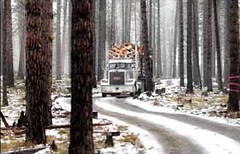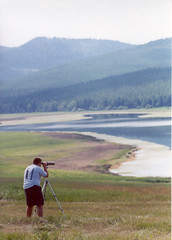Huge timber company backs off plans to develop Montana forest land

Posted January 6, 2009 at 9:34PM
Plum Creek Timber Company, the nation's largest private landowner (8 million acres nationwide), has withdrawn a controversial request to pursue residential development of remote land in western Montana. The company had requested an easement on timber roads owned by the US Forest Service in order to access the land. After two years of talks between Plum Creek and the Forest Service, the federal agency appeared poised to grant the request in the final days of the Bush administration.
 But, in a letter addressed to the Missoula County Board of Commissioners, who had opposed the request, the company said it had communicated with the agency and was withdrawing its request after over 30 open meetings with local and federal officials and members of Congress. Identical letters were sent to a number of officials in other Montana jurisdictions, Senator Max Baucus, and Congressman Denny Rehberg.
But, in a letter addressed to the Missoula County Board of Commissioners, who had opposed the request, the company said it had communicated with the agency and was withdrawing its request after over 30 open meetings with local and federal officials and members of Congress. Identical letters were sent to a number of officials in other Montana jurisdictions, Senator Max Baucus, and Congressman Denny Rehberg.
The letter is linked to an informative article on the New West Development website. Matthew Frank writes:
"The easement amendment was privately negotiated between Plum Creek and the Forest Service to clarify the decades-old easements and ensure Plum Creek access across Forest Service for purposes besides resource extraction, namely to access residences. Residential development has become a big part of Plum Creek's business as the timber industry flounders from the effects of the housing downturn. In October, the Government Accountability Office announced it was investigating the deal . . .
"But Plum Creek said in September that Montana counties that wanted to back out of the amendment could.
"With [Plum Creek CEO Rick] Holley's letter, said Plum Creek communications director Kathy Budinick, 'we're simply taking it a step further and saying, we're just not going to implement it anywhere.'"
The letter cited a general "lack of receptivity" to the idea, which had also been forcefully opposed by President-elect Obama during the presidential campaign last year. Potentially at stake were 1.2 million acres of remote Montana land, much of it adjacent to wildlife preserves and federally owned forests.
 While these sites would have been super for the people who could afford to buy them and didn't mind driving for an hour anytime they wanted something from the store, from an environmental perspective they would have simply been highly habitat-disrupting, automobile-dependent sprawl. This is great news for Montana and for the environment.
While these sites would have been super for the people who could afford to buy them and didn't mind driving for an hour anytime they wanted something from the store, from an environmental perspective they would have simply been highly habitat-disrupting, automobile-dependent sprawl. This is great news for Montana and for the environment.
The much more sensible approach is that advocated by Missoula County Commissioner Jean Curtiss, who wants to address the issue of private land development in her county (where Plum Creek owns 58 percent of the land) through orderly planning and zoning procedures. Last April, Curtiss told New West:
"One of our goals is to try and guide growth so that you put growth where the infrastructure is and don't just spread it hilter-kilter, especially with all the wildfires we've been having every year. Those folks that build a house out there are going to think someone's going to protect it. And the roads aren't necessarily going to be built to do that."
Plum Creek grew dramatically after it converted from a limited partnership into a real estate investment trust in 1999. Within two years, it more than doubled its forest acreage, largely because of a $3.8 billion merger with a subsidiary of Georgia-Pacific. It also acquired land that held more value as potential real estate development rather than industrial forestland. As of two years ago, according to a 2007 story in the Missoulian, Plum Creek's real estate activities contributed 30 percent to 35 percent of its total cash flow.
To the company's credit, last summer it negotiated a deal to sell 320,000 acres to The Trust for Public Land and The Nature Conservancy for conservation. Pursuant to the resulting Montana Legacy Project, all of the land will be conserved and some transferred to Forest Service ownership.
Now, allow me a free-association indulgence. Cue up Willis Alan Ramsey, who only made one fine album, back in the 1970s:
Show in this town is over
Maybe just never began
And it's goodbye to ol' Missoula
done all that I can
And it's goodbye to ol' Missoula
goodbye to ol' Missoula
goodbye to ol' Missoula
Sleepy town
The song was resurrected by Jimmie Dale Gilmore on his 2000 album, One Endless Night. The full lyrics are reprinted in a really nice short essay on Missoula that I found through the wonders of an Internet search.